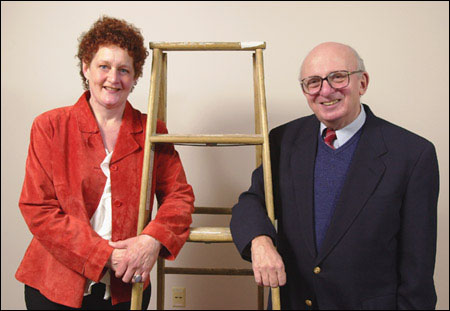Ombudsmen open for business:
Will provide confidential assistance to faculty, staff, and students

The new University Ombuds Office, providing confidential and impartial problem-solving assistance to all faculty, staff, and students, opened on Feb. 1.
Newly appointed ombudspersons, Henry Ehrenreich, the University Ombudsperson and Clowes Research Professor of Science, and Lydia Cummings, formerly the senior associate director of the Office of Labor and Employee Relations, are available to offer counsel to those seeking to resolve issues such as academic disputes, supervisor-employee conflicts, or discrimination.
According to Ehrenreich, the office will report to the provost but remain independent of any University administrative structure. It will offer a “safe haven” for those affected by conflicts or problems arising in the course of their work or study at the University, particularly problems involving questions of equity or justice. The office will supplement but not replace existing mechanisms for addressing grievances within the various faculties and unions.
The office was established by President Lawrence H. Summers, the provost’s office, and the deans last August in conjunction with the announcement of the University’s values.
Though the University Ombuds Office is new, the concept is certainly not. Ombuds offices have existed at many other colleges and universities for some time; in the Longwood Medical Area, Linda Wilcox has served as Ombudsperson for Harvard’s Medical School, Dental School, the School of Public Health, and the affiliated hospitals since 1991. She is an active member of the Ombuds Council, established in October 2002, and chaired by the University Ombudsperson. This group has provided advice important to the development of this new office. Its members include ombuds and others who currently serve as problem solvers and troubleshooters, or advisers in their schools or departments. This council will continue to be helpful in collecting widely applicable advice, and considering issues of consistency in University problem resolution.
As Ombudspersons, Ehrenreich and Cummings will draw on their extensive experience at the University (a total of 64 years between them) that spans the worlds of those directly involved in Harvard’s academic enterprise and those who provide its administrative support. The teaming of a seasoned faculty member from the Faculty of Arts and Sciences, Harvard’s oldest and largest faculty, and a respected problem solver from central administration who started her Harvard career as an administrative assistant will broaden the perspective of each and should serve the community well.
Ehrenreich and Cummings agree that strengthening the ties connecting faculty members, students, and staff within and among Harvard’s academic institutions, its affiliates, and the central administration will serve to deepen the sense of community that the President’s values statement is designed to foster. They regard this effort to build community as one of the primary aims of their new endeavor.
Ehrenreich is a physicist who has been a member of the Harvard faculty for 40 years. In addition to his teaching duties and his ongoing research, primarily in the area of semiconductor theory, Ehrenreich has served his profession, his country and his University, throughout his career. He has participated on numerous professional boards and committees and remains a co-editor of the distinguished Solid State Physics series. He has also served on advisory boards for the Departments of Defense and Energy and as consultant to the White House Office of Science and Technology Policy as well as to private industry. At Harvard, Ehrenreich chaired the Science Center Executive Committee and the Committee on the Science Core Curriculum, and directed the Materials Research Science and Engineering Center. He was a member of the Committee on Free Speech Guidelines and continues to serve on the University’s Committee on the Environment.
Cummings, who studied at Radcliffe, began her Harvard service in 1979 managing the staff office for the vice president for administration. Before moving to the Office of Labor and Employee Relations (LER) in 1996, she mastered the complexities of Harvard’s human resource and financial data as associate director for information management user systems. In LER, she has most recently been involved in the negotiation, administration, and interpretation of the University’s collective bargaining agreements, and is widely recognized as the reigning expert on Harvard’s complex employment policies. She has served since 1990 as the co-chair of the University Problem Solving Team, charged with resolving grievances brought by members of the Harvard Union of Clerical and Technical Employees.




